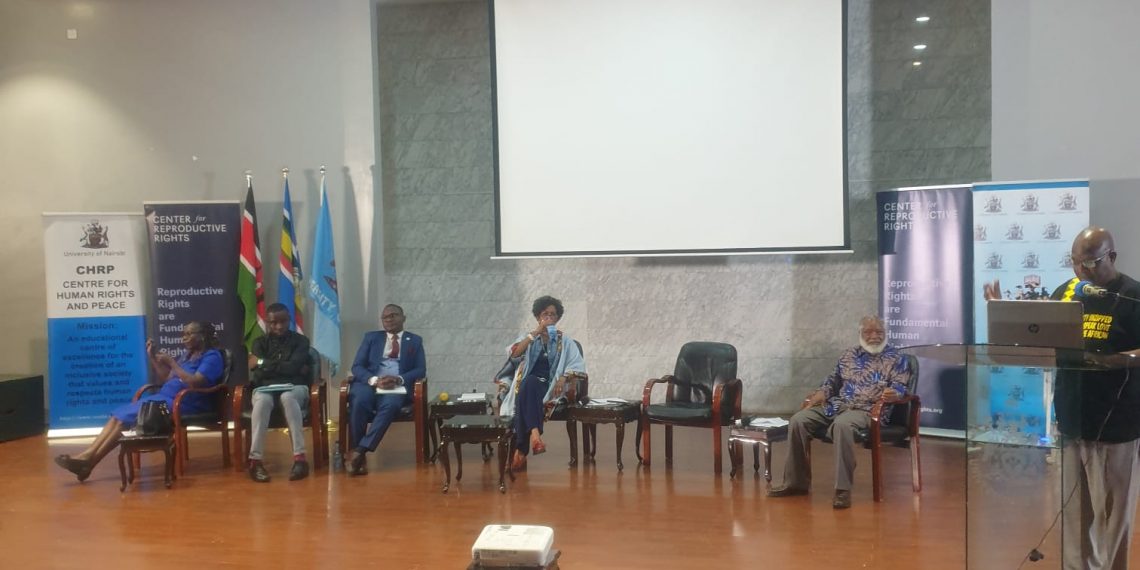By Samwel Doe and Anne Juma
Civil society organizations, religious leaders, academicians and university of Nairobi students held a colloquium to enlighten on the infringements of the basic human rights of those who identify as sexual minorities.
The discussions delved on the rule of law, social justice, good governance and minority rights in Kenya, emphasizing that homosexuals are at a risk of violence and discrimination, stigma and human rights violation as Kenya continues to criminalize sexualities that defy the order of law.
In a ‘Colloquium on African Sexualities: traditions, perspectives and human rights with a sub theme of language of morality and morality of language, held at the University of Nairobi (UoN) convened by UoN Centre for human rights and peace, the Trust for Indigenous Culture and Health (TICAH), the Centre for Reproductive Health Rights (CRR), GALCK, and The Kenya Legal & Ethical Issues Network on HIV and AIDS (KELIN) on whether African Communities understands sexuality from a rational point of view. Prof Kithaka wa Mberia from the department of Kiswahili UoN while addressing the role of language on moral discourse said that culture influences language and when culture change language also changes.
He said that language influences the mind and culture for example we have kind of moral conditions we put in place to make language acceptable and not offensive and or demeaning. “Culture can influence language. Languages also have a way of innovating. Morality and law sometimes converge but they are different. We also have some kind of moral conditions that we put in place to make language acceptable.”
“There are euphemisms that we use to make language appealing and acceptable for example how certain body parts are called or named by society, “Prof Kithaka Wa Mberia said.
He explained that language is a powerful tool that is used to gather, define, exert, and maintain social influence. Language influences people’s attitudes towards reality, choices and goals, both short and long term. As such, some actors have argued that the superficial features of language can seem unprejudiced and yet serve a discriminatory agenda. Language in the context of sexualities shapes people’s attitudes towards issues such as sexual activity outside of marriage, sexuality, sexual relations, and choices.
While moderating the panel discussion session UoN department of Sociology, social work and African Women studies Dr. Kathleen Anangwe said that in Kenya alternative sexual realities exist while posing a question to the panellists whether morality is born out of nature or convention.
According to historical evidence, aside from human intuition, the majority of humans have engaged in sexual interactions. However, the understanding of sexuality has differed among societies since each regulates and expresses it differently. In addition, time and place appear to explain the variety of perspectives conceivable in discussions about sexuality by offering specific contexts within which language can be used to express aspects and methods.
“The multiplication of human beings exists because of sex.” said Dr. Patrick Nyabul, chair Department of Philosophy & Religious Studies at the University of Nairobi. “An analysis of sex and sexuality might be biological or conceptual. Sociology and anthropology views of sex is that it is not just for procreation but for other purposes while religious views consider sex sacred, others say that it is mutual but sexual affairs has become a personal choice” added Dr. Nyabul.
When gender is coupled with sex and sexuality, it is characterized as socially created, emphasizing roles and duties as the prism through which to investigate power dynamics, decision making, and relationships.
“Furthermore, data from psychology reveals that gender identity, defined by one’s personal and internal sense of self as male, female, or other, is a key to understanding sexuality,” Dr Nyabul; said adding that, “Sexuality deals with gender identity, gender roles, intimacy, love, and affection. It encompasses individuals’ attitudes, values, knowledge, and behaviours. It concerns one’s sexual feelings, ideas, attractions, and behaviour toward others. In this way, one can find other persons physically, sexually, or emotionally appealing even outside of the established normative framework.”
On his part Reverend Godfrey Owino Adera, addressing language, holy texts and sexuality and the African perspectives on theologies of sexuality said that bible talk of sex as acceptable between adult male and female for companionship and reproduction.
“The bible doesn’t say sex is wrong but there are particular sexual activities that the Bible doesn’t allow, however our constitution allows Kenyans to be accommodating of new cultures and behaviours “said Rev. Adera adding that, “the constitution 2010 expects new Kenya where we should be accommodative to even people, we assume to be deviant and the software of religion is love, justice and equality therefore we should all embrace everyone as they are.”
Ms Lorna Dias addressing the state of sexual and gender minorities in Kenya their challenges and prospects said that sex is much more than procreation and we should not be conditioned as a society.
She observed that we should draw a balance between individual choices and societal views.
Lorna also noted that specific nature of gender relations varies among societies, the general pattern is that women, gender and other sexual minorities have less personal autonomy, fewer resources at their disposal, and limited influence over the decision-making processes that shape their societies and their own lives.
“People have very different experiences based on their sex, gender, or sexual orientation, and the fact is that women, girls, and LGBTQ+ people often face discrimination means they don’t have equal access to equal platform of enjoying fundamental rights and freedom.”
Lorna elaborated that human deserve the opportunity to enjoy the pleasures of the dignity of human sexuality without shame adding that minority rights include the right to exist, freedom from discrimination and persecution, protection and promotion of identity.
Joshua Malidzo addressed law and sexual minorities rights in Kenya saying that from the preamble of constitution 2010 the law recognizes diversity with article 10, 19 and 27(4) recognizing protections of the marginalized however instances of violence have been recorded.
“If we allow public opinion to rule there will be no constitutional rights, “he observed.














